20 Practical Travel Tips for Beginners to Help You Travel Like a Pro
Are you planning your first trip or simply looking to improve your travel skills? These travel tips for beginners will help you navigate the world of travel with more confidence and ease.
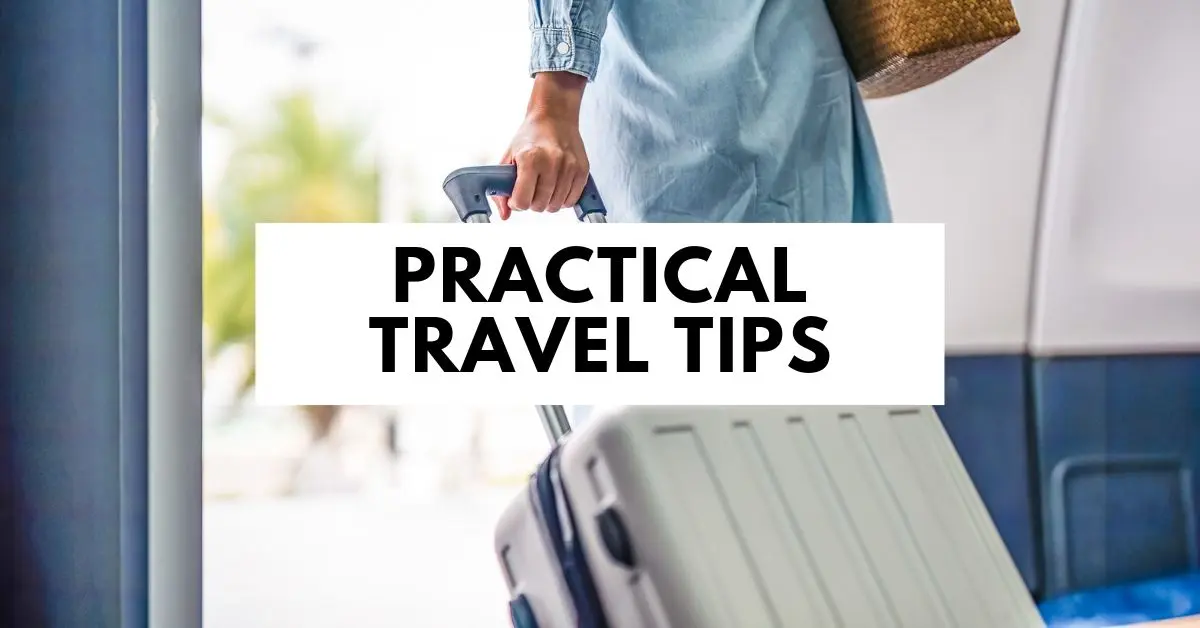
Disclaimer: This post may contain affiliate links, meaning we earn a commission at no extra cost. Please refer to our full disclosure for details.
What do I wish someone had told me when I started planning vacations? One invaluable tip is learning to use travel points to save money and travel more. Also, downloading offline maps and packing a travel adapter are straightforward tips that you don’t realize how helpful they are until you need them.
In this article, we’ll dive into practical travel tips to help you travel like a pro.
Travel Tips for Beginners
1. Start with Google Flights to Begin Researching Flights
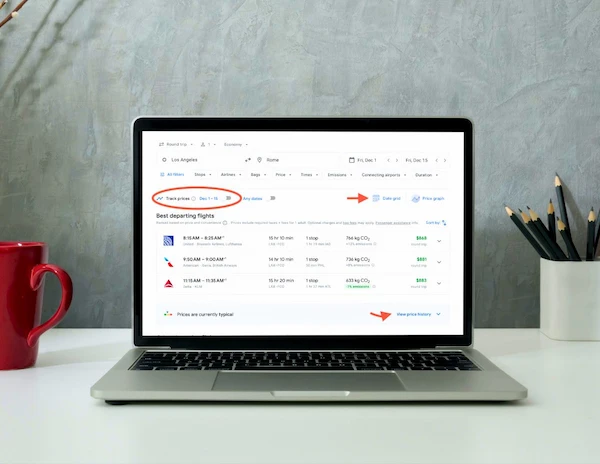
Google Flights is an excellent starting point for flight research. It lets you compare options across different airlines, check flexible dates, and track pricing for chosen routes. You can customize your search by selecting cabin class and number of passengers.
We particularly appreciate the price tracking feature. We’ve set up alerts for our favorite routes, allowing Google Flights to notify us when prices drop. The platform also provides a historical price guide, helping you determine if a fare is low, high, or typical for your selected route.
Google Flights simplifies flight research and booking, making it a valuable tool for any traveler.
2. Book Trips During the Shoulder Season
Traveling during the shoulder season offers significant advantages—lower prices, fewer crowds, and, for the most part, pleasant weather. This period is ideal as most people are back at work or school, making popular destinations less hectic.
For first-time travelers, avoiding the chaos and expense of peak seasons is a smart move. If you’re restricted to peak travel times, minimize stress and cost by exploring early in the morning or visiting less-known sites. Booking early or during sales can also help save money.
We usually travel during off-peak times, unless a destination’s peak season offers unique attractions that are unavailable at other times of the year. This approach reduces costs and enhances enjoyment by providing a more relaxed experience.
3. Apply for TSA PreCheck (or better yet, Global Entry)
Considering TSA PreCheck or Global Entry? These programs save you time and hassle at airports, making them worth the investment, even for infrequent travelers.
TSA PreCheck: For approximately $78 (depending on the provider), you receive five years of expedited security screenings in the U.S. You can skip removing shoes, belts, and jackets, and keep laptops and liquids in your bag.
Global Entry: For $120, you get all the benefits of TSA PreCheck plus quicker U.S. customs processing when returning from abroad. The fee is valid for five years, and children under 18 are eligible for free admission when applying with a parent or guardian.
Decision Time: If you use TSA PreCheck even once a year, that’s about $15 per trip. Global Entry, offering additional customs speed, works out to $24 per year—still a great deal if you travel internationally.
Pro Tip: Check if your credit card covers these fees as a perk. Many do, which can make enrollment effectively free.
Bonus Tip: Add CLEAR for Quicker Airport Security
If you’re a frequent traveler, consider adding CLEAR to further speed up your airport security experience. With CLEAR, you bypass the traditional ID check and go directly to TSA screening. While it does come with a yearly cost, it’s particularly worthwhile if you travel often or if the fee is covered as a perk by your credit card. This can be a valuable addition for those looking to minimize airport waiting times even further.
4. Pack Light

Mastering the art of packing light can significantly improve your travel experience. It’s not just about saving on baggage fees; it’s about the freedom and ease of moving around with less. I’ve learned this the hard way, transitioning from someone who used to pack for every scenario to someone who sticks to a capsule wardrobe and re-wears outfits.
We’ve improved by packing versatile outfits, handwashing certain items, and utilizing laundry services when available. I’ve found that sticking to the basics and using reusable travel containers helps minimize space for toiletries.
5. Understanding Currency and Exchange Rates
Check Exchange Rates: Use a reliable exchange rate app, such as Xe, to stay updated on current rates and avoid potential scams.
Use the Right Credit Cards: Only use credit cards with no foreign transaction fees. When making purchases, always choose to be charged in the local currency and let your bank make the exchange for you.
Accessing Cash: Withdraw cash from bank ATMs at your destination for safer transactions and better exchange rates. If you need local currency before you leave, consider getting some from your bank. Avoid airport currency exchange booths due to their high fees.
6. Take Advantage of Credit Card Points
Credit card points are rewards earned from everyday purchases, which can be redeemed for travel expenses such as flights and hotels. Some cards offer bonus points for specific spending categories.
Maximizing credit card points can significantly reduce travel costs. Find a card that matches your spending habits and pay off the balance in full each month to avoid negating the benefits with interest. By using your card responsibly, you can accumulate points and then use them towards travel.
Most of our accommodations and flights are paid for using travel points, which demonstrates the value of these rewards.
7. Sometimes Spending More for a Hotel Room is Worth It
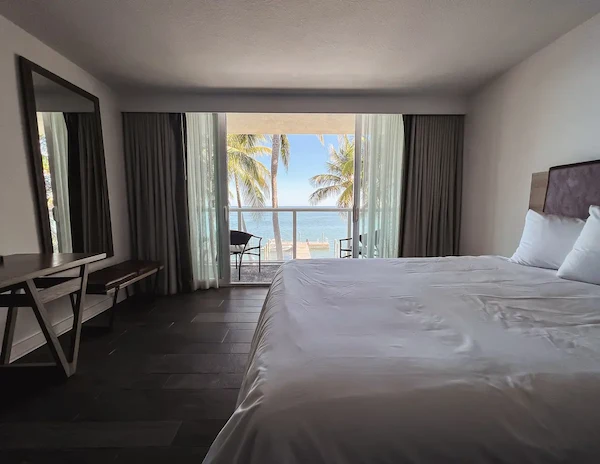
While budgeting for accommodations, consider whether saving $20-$50 per night at a poorly reviewed location is truly cost-effective. Investing that extra amount for a better location and superior reviews often ensures a comfortable stay and peace of mind.
As we travel more, comfort has become a priority. Staying in a cleaner, comfier hotel with friendly staff and the right amenities significantly enhances our experience. Nobody wants to end their day in a dirty room or a sketchy neighborhood, which can ruin the relaxation and security you need.
Always research thoroughly. More expensive doesn’t always mean better, so compare and read reviews carefully. Sometimes, paying a bit more is justified for a better overall experience.
8. Have An Itinerary Ready to Look At
Organize all your travel details into a single document or spreadsheet. Include:
- Flight Information: Reservation numbers, dates, times, flight numbers, and airports.
- Hotel Information: Confirmation numbers, check-in dates, addresses, and phone numbers.
- Activities & Tours: Confirmation numbers, dates, meeting locations, start times, and contact details.
Save the itinerary in an accessible format—print a copy and keep a PDF on your phone for quick reference while traveling. Alternatively, an app like TripIt automatically manages and organizes these details when you forward the reservations to your account.
9. Download an Offline City Map from Google
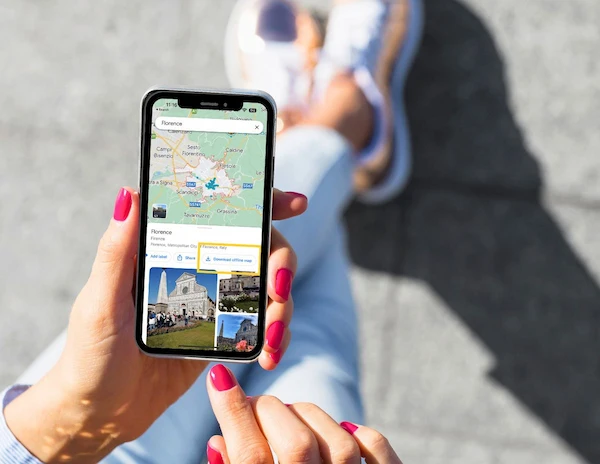
Google Maps offers a great feature for travelers: offline city maps that you can download to your phone, which allows you to navigate without Wi-Fi or a data plan.
Here’s how to do it:
- Download the Google Maps app and sign in.
- Search for the city you’re visiting.
- Scroll down and select “Download offline map.”
- Choose the area you want to download.
Remember, offline maps take up space on your phone, so download them when you have Wi-Fi and before your trip. This ensures you can navigate the city even without an internet connection.
10. Download Google Translate
Visiting a foreign country? Don’t leave without downloading Google Translate. This free app helps you communicate with people who don’t speak your language and even translates foreign signs and menus using its camera feature.
This app is convenient, and no traveler should be without it.
11. You’ll Need a Travel Adapter
Don’t forget to bring a travel adapter when traveling to a foreign country. It ensures your electronics can be safely plugged in without causing any issues, like shutting down the electricity at your hotel. This is easy to overlook when planning a trip, especially for first-time travelers, but it’s essential to remember.
12. Prescription Meds Should Always Stay With You
Always keep your prescription medications in your personal item bag, which will stay with you throughout your travel days. Don’t risk packing them in checked luggage, where they could be lost or delayed. Packaging a few over-the-counter meds like ibuprofen and allergy pills is practical. You might not find the same medications at your destination, so it’s better to be prepared for unexpected headaches or issues during your trip.
13. Practice Safety
Always prioritize your safety and remain aware of your surroundings, regardless of where your travels take you.
Here are some practical safety tips:
- Share your itinerary with someone back home and update them on your whereabouts.
- Keep your wallet in your front pocket, or use a money belt for extra security.
- Use a money belt to store your passports separately.
- Walk confidently and act like you know where you’re going.
- Be aware of your surroundings at all times.
- Don’t let your drinks out of sight.
- Wear a crossbody purse or consider an anti-theft bag for added protection.
14. Take Advantage of Free Walking Tours
Free walking tours are a great way to explore a new city on a budget. Many destinations offer them, led by locals passionate about sharing their knowledge. These tours typically operate on a tips-based system, and we recommend tipping $10-20 per person, much less than a typical tour.
In some places, like Japan, a small gift from home may be more appropriate than a cash tip, so research the local tipping culture before you travel.
We’ve found these tours to be an excellent way to experience a city without spending much. To find free walking tours, check out companies like Free Tours by Foot, Free Tours, International Greeter Association, and Discover Walks (free and paid tours).
15. Be Open to New Experiences
Travel is an opportunity to experience new cultures, perspectives, and adventures. It’s a chance to broaden your horizons and gain a deeper understanding of the world. Try local cuisines, meet new people, and participate in activities you’ve never done before.
16. Eat Where the Locals Eat
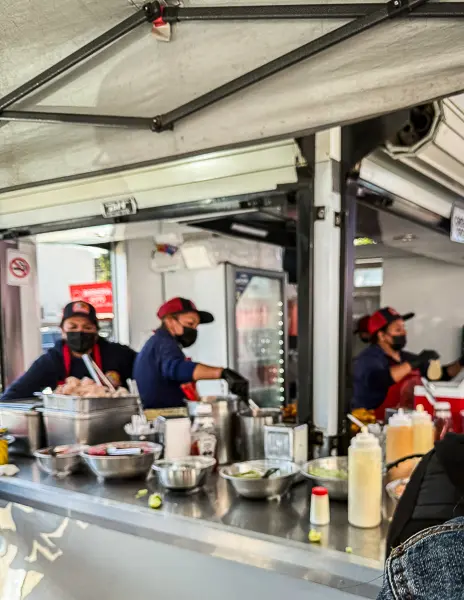
A top travel tip, especially for food lovers, is to avoid tourist traps and seek out the places where locals eat. This is how we connect with local culture and discover new, authentic foods.
Sometimes, we book food tours to get a head start on finding local favorites and the best spots to eat, especially when we’re short on time.
Here are some tips for finding the best local eateries:
- Observe where the locals gather—a line of locals is usually a good sign.
- Avoid restaurants that feature photos on their menus.
- Steer clear of spots near major tourist sites; they’re often aimed at tourists.
- If the menu is in multiple languages, it’s a red flag.
- Look for handwritten menus—these places often serve the best food.
- Don’t hesitate to try hole-in-the-wall spots away from the tourist areas.
17. Consider Renting a Car
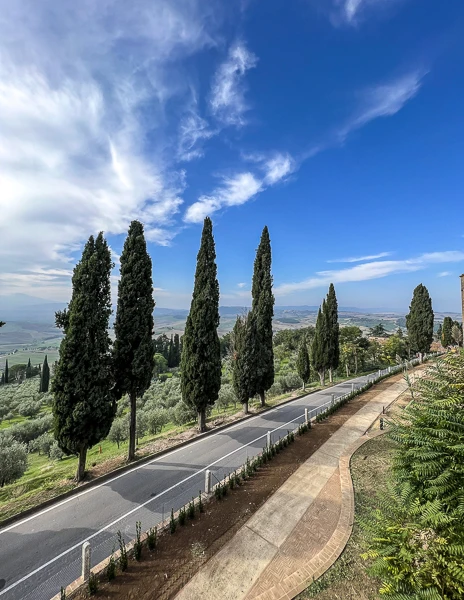
While public transportation is excellent in many big cities, renting a car allows you to explore off-the-beaten paths and discover hidden gems at your own pace. In Tuscany, renting a car was essential for us to explore the countryside, and it turned out to be a cost-effective choice compared to hiring a private guide.
Weigh the pros and cons of renting a car based on your itinerary and the experiences you want to have. Sometimes, the cost and stress of driving on unknown roads is not worth it.
18. Book Your Transportation in Advance
If you’re not renting a car, plan your transportation in advance. It’s practical to book a car service for airport pickups to avoid taxi lines and scams. If you’re using public transportation, be aware of the train schedules and routes in advance. Many major airports offer direct trains to the city, and you can sometimes purchase tickets in advance.
Additionally, you can download Uber, Lyft, or a local taxi app and have it ready to use on your phone. This way, you will be prepared when you need to request transportation at specific points throughout your trip.
19. Always Carry Tissue Paper With You
Always have tissues and wipes in your bag when traveling. Not all bathrooms are fully stocked, and you might need them more often than you think—you’ll thank me later.
Additionally, be prepared to pay a small fee (typically $1 or less) to use certain bathrooms, especially in clean and well-maintained areas.
20. Always Be Kind
Kindness goes a long way, whether you’re interacting with people at the airport, locals, or fellow travelers. A positive attitude and respectful behavior can significantly impact your travel experience.
Remember the saying, “You can catch more flies with honey than with vinegar.”
5 Key Things to Do to Prepare for Your Trip
- Research Your Destination: The more you know, the better you can plan your activities and itinerary.
- Plan Your Itinerary: Once your flights and accommodations are booked, outline your daily activities based on what you want to see and do.
- Book Additional Transportation: Once your itinerary is finalized, book any necessary train tickets, car rentals, or other forms of transportation in advance.
- Check Your Travel Documents: Double-check all your travel documents and verify that the dates and details are correct.
- Create a Packing List: Make a checklist of items to pack and mark them off as you go to avoid forgetting anything.
BEFORE YOU TRAVEL, CHECK OUT THESE RELATED READS:
- Explore 12 Travel Options for Planning Your Next Vacation
- Tips to Book and How to Use Airbnb
- Airbnb Pros and Cons
Kathy Ava
Meet Kathy Ava, a food, travel, and cruise writer based in Los Angeles/Pasadena, and the owner and main writer of Tasty Itinerary. With over 20 years of experience planning trips and logistics at her full-time job and for herself, she's become a pro at crafting unforgettable tasty itineraries. She's always on the hunt for delicious, fun travel destinations and cruise itineraries. She firmly believes that life is short and we must make the most of it, so always say yes to dessert.




